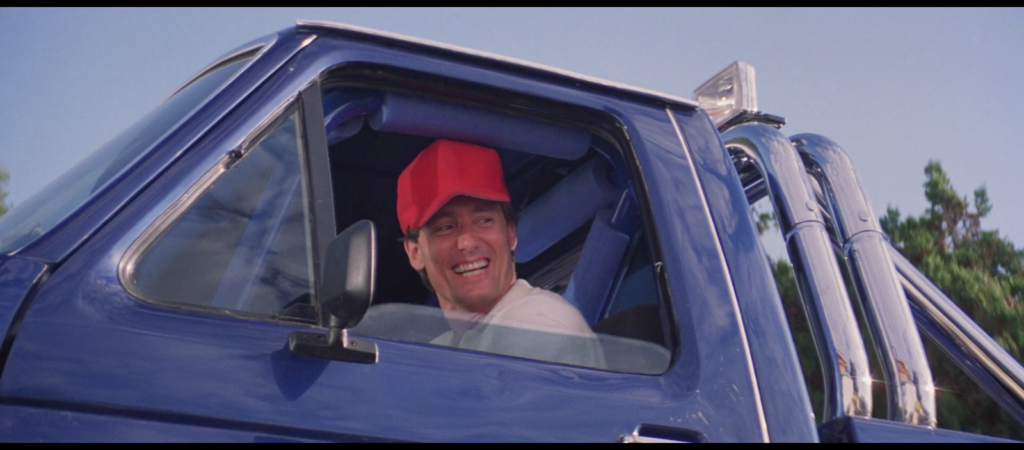Posts Tagged ‘jeffrey dahmer’
“Dahmer — Monster: The Jeffrey Dahmer Story” thoughts, Episode Ten: “God of Forgiveness, God of Vengeance”
September 29, 2022Ian Brennan, Ryan Murphy, Evan Peters, Niecy Nash, Richard Jenkins, and their collaborators have created one of the most harrowing, most viscerally upsetting, television shows I’ve ever seen. And when they finally turn the violence against its primary perpetrator, they make it hurt, they make it hard to look at. In the end, there’s nothing glamorous about this dead man who caused the deaths of so many others, who shuffled and stumbled his way through life, whose presence at the center of a vortex of homophobia, racism, bad policing, bad medicine, bad parenting, and pervasive isolation tells us so much about how what this country values, and how it rewards those who fail to measure up.
I reviewed the finale of Dahmer for Decider. I’m grateful to have taken on this difficult assignment.
“Dahmer — Monster: The Jeffrey Dahmer Story” thoughts, Episode Nine: “The Bogeyman”
September 28, 2022Not all of Jeffrey Dahmer’s victims died. No, not all of them. I’m not even talking about the escapees — Tracy Edwards, Ronald Flowers, Somsack Sinthasomphone, the jogger who dodged his baseball bat. I’m talking about his slain victims’ families, his neighbors, even his own family, even the entire city of Milwaukee. “The Bogeyman,” once again directed by Jennifer Lynch from a script by Ian Brennan, David McMillan, and Reilly Smith, depicts the many ways in which Dahmer haunted all these people even while safely behind bars. (Safely for them, physically speaking, if not for himself, but we’ll get to that.) They lived on, but — as he’d longed to do with his actual, physical victims — he got into their heads, permanently.
“Dahmer — Monster: The Jeffrey Dahmer Story” thoughts, Episode Eight: “Lionel”
September 27, 2022For Lionel, though, clinging to the belief that his son was insane when he committed his crimes is important because, for a long while at least, he lives in terror of the idea that he was in some way responsible for it all himself. When Jeff brings up the way Lionel used to help him collect and dissect roadkill, Lionel literally starts laughing in comical outrage over the idea. “You ain’t gonna lay this on me, no!” he says. “It’s not my fault! I didn’t do this! I was a good dad to you!” Of course he wants to believe this. Who wouldn’t, in his position?
“Dahmer — Monster: The Jeffrey Dahmer Story” thoughts, Episode Seven: “Cassandra”
September 27, 2022“I called y’all for months! Now y’all finally came and it’s too late! You came too late!”
That would be the first time during this episode of Dahmer that I burst into tears.
“You knew he was a monster.”
“I knew. But nobody heard me.”
“I hear you, Glenda.”
That would be the last time during this episode of Dahmer that I burst into tears.
But there were times in between, and times afterwards, times after the episode ended and left me alone with what I’d just seen. Once again directed by Jennifer Lynch, from a script by co-creator Ian Brennan, Janet Mock, and David McMillan, this installment — titled “Cassandra,” after the prophetic figure from Greek mythology doomed to see the future without anyone every listening to her about it — is the most emotionally taxing thing I’ve seen on television all year. In terms of my visceral reaction to it, it’s one of the most emotionally taxing things I’ve seen on television ever.
“Dahmer — Monster: The Jeffrey Dahmer Story” thoughts, Episode Six: “Silenced”
September 26, 2022Dahmer may be the most grueling drama I’ve ever covered, and its sixth episode, “Silenced,” is one of the saddest hours of television I’ve ever seen. Anchored by a tremendous, heartfelt, achingly vulnerable performance by deaf actor and former reality TV star Rodney Burford, it offers the corrective that Dahmer has needed by giving one of the killer’s victims his own story, then slams the door on it, as you knew it must. That knowledge does not soften the blow one bit.
“Dahmer — Monster: The Jeffrey Dahmer Story” thoughts, Episode Five: “Blood on Their Hands”
September 26, 2022It’s only by cruising through life on Easy mode due to his race and gender — despite his outcast status, despite his closeted sexuality, despite his unspeakable urges, despite his overall taciturn and unlikeable demeanor — that Jeff got away with everything he got away with for as long as he did. Looked at with clear eyes, his life is just one long chain of fuck-ups. If he were a different color, if his victims were a different color, that chain might have been cut short much, much earlier.
“Dahmer — Monster: The Jeffrey Dahmer Story” thoughts, Episode Four: “The Good Boy Box”
September 23, 2022There are three shots from this episode that are going to stay with me, I think. The first is Jeff in the bathroom mirror, covered in blood, accompanied by a menacing sting from the excellent score by art-rock musicians Nick Cave and Warren Ellis. The second is the moment where a drunken Jeff raises his cup of beer in a toast to the test of strength at the fair, emblazoned with phrases like “HE MAN” and “GOOD BOY,” phrases that mean more to him than anyone could have ever known. The third, probably obviously, is when he kisses the severed head through the plastic at the end of the episode. The man he murdered is now his keepsake, his secret. And many more men and boys will die before the secret is out.
“Dahmer — Monster: The Jeffrey Dahmer Story” thoughts, Episode Three: “Doin’ a Dahmer”
September 23, 2022We’re only three episodes deep into Dahmer’s ten-episode run, and already the accrual of brutal, depressing incidents has become difficult to endure. The fantastic, committed performances of Evan Peters as Jeffrey and Richard Jenkins and Penelope Ann Miller as his parents manage to make everything both better and worse. These are real, recognizable people with real, recognizable hopes and fears — the scene in which an astonished, joyful Joyce is offered a job counseling women at the center where she was once a patient is a genuinely touching moment of kindness towards an otherwise resolutely unpleasant, if very ill, person — that Jeffrey’s deeds will pulverize as surely as his hammer smashed those bones. It’s not going to be easy to watch, but then, that’s the point.
“Dahmer — Monster: The Jeffrey Dahmer Story” thoughts, Episode Two: “Please Don’t Go”
September 22, 2022Once again, cowriters Ian Brennan and Ryan Murphy, led by director Clement Virgo, create a gruesome portrait of a broken person who can only find wholeness by breaking other people, quite literally down into their constituent body parts. He is both sad and contemptible, a shattered person who finds his meager pleasures only in shattering other people. The degree of difficulty inherent in handling this material is astronomical, but so far, they’ve pulled it off. I’m darkly excited to see where this ten-episode limited series goes. I’m anxious. I’m frightened. I’m sick. I’m watching good television.
“Dahmer — Monster: The Jeffrey Dahmer Story” thoughts, Episode One: “Episode One”
September 22, 2022It’s with all this in mind that I approached TV superproducer/auteur Ryan Murphy’s stab at the material (no pun intended) with trepidation. Murphy is perhaps the most puzzling of all the big-name New Golden Age of TV figures. He’s responsible for American Crime Story, which in three distinct seasons, each overseen by different creators, established itself as probably the best anthology series in television history. He’s also responsible for…well, for everything else he’s done, from Glee to American Horror Story. These productions did not fill me with confidence; nor did the possibility that, as an attempt to score easy points with the audience, this version of Dahmer’s story would be treated as some sort of corrective to earlier interpretations, painting him as an unmitigated and unrepentant monster while showing little interest in what made him what he was and how he struggled with it. I mean, Monster is in the subtitle, or title, depending on your point of view. Can you blame me?
So I’m happy, if that’s the right word, to report that Ryan Murphy and his co-creator Ian Brennan’s Dahmer is as good an artistic take on Dahmer’s life and crimes as I’ve yet seen. Directed by TV veteran Carl Franklin, the first episode alone brought me to tears. Dahmer is treated as appropriately pathetic, but the viciousness of his crimes is not candy-coated. It’s clear that he knows something’s wrong with him, but he’s past the point of trying to do anything to stop it, and it’s other people — almost entirely people of color — who pay the price.
075. Big Truck Energy
March 16, 2019It occurs to me, sitting here as I begin to write today’s Road House essay, that one of Brad Wesley’s goons is almost certainly a serial killer.
Look at this. This is two carloads of goons pulling into Brad Wesley’s drive way so he can chew them out for their failure to reinstate his sister-son Pat McGurn to his job as bartender at the Double Deuce. In the Oldsmobile you’ll find the people responsible for the debacle: Tinker, O’Connor, and Pat himself. Jimmy is in the mansion with his father (source for this claim?). Riding shotgun in the monster truck is Karpis, the dashing thug who vanishes from the film without fanfare, and Ketchum, the anonymous thug who has a boot-mounted knife and will go on to murder a main character with a knife he keeps in a sheath on his belt.
Ketchum, you may recall, or you may not recall more to the point, is the most anonymous goon in the whole movie. Jimmy, Tinker, O’Connor, Morgan, Pat—they’re all mentioned by name, repeatedly. Karpis is not mentioned by name and is absent for the back two thirds of the film, but he looks like Karpis and thus is tough to forget. Ketchum looks like a teamster who got a speaking part when the real actor canceled due to a family emergency and they found out he had his SAG card. He looks like the guy buying a phone ahead of you at the Verizon store. He looks like your friend’s mom’s evangelical cousin on a Christmas card with a family portrait on it that they forgot to take down until you went over to your friend’s place for the Super Bowl. He looks like the guy drying his hands next to you in the rest stop men’s room on the New Jersey Turnpike. He looks like everyone and no one. He’s every white man, it’s all in him. Anything you want done, baby, he’ll do after the gym.
Yet he carries around a knife you could stop a White Walker with. He has retrofitted at least one normal item of clothing that we know into a deadly weapon. When he’s summoned to his boss’s place for a talking-to, he drives over in a monster truck the way you or I would hop in a Mitsubishi.
So he’s a white man in his 30s. He’s blandly, anonymously handsome. He has a barely concealed fixation on instruments of torture and death. He’s a knife guy, and a gun guy too most likely given later events. He’s outwardly conservative in appearance but he indulges in the occasional ostentatious “how did we miss this?” affectation: Instead of dressing up like a clown for children’s parties, or hanging out in cop bars, or keeping a human head in the closet of his boyhood home, he drives around town in a monster truck. It’s like he’s daring you to notice, knowing you won’t be able to bear looking too closely if you do.


